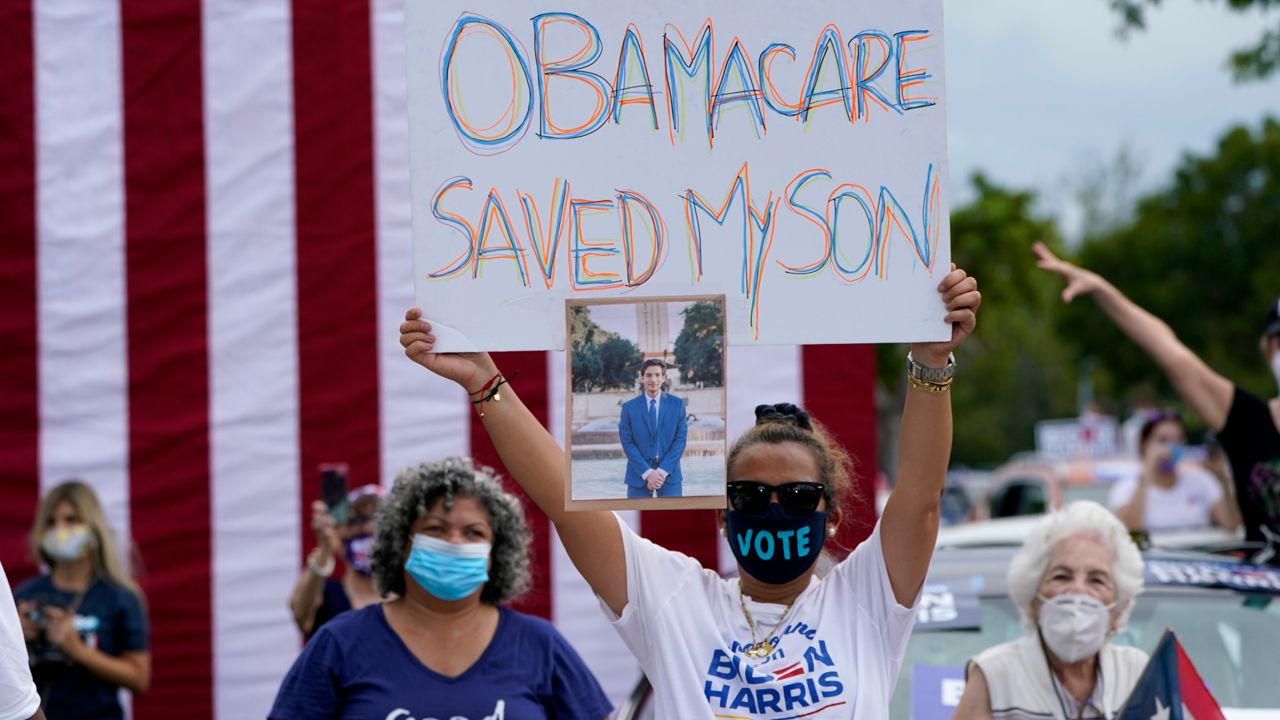LOUISVILLE, Ky. — The Supreme Court on Tuesday heard a lawsuit that could accomplish something elected Republicans have not been able to for years: the complete dismantling of the Affordable Care Act (ACA).
If California v. Texas, the first high profile case to be heard by the court after the confirmation of Amy Coney Barrett, results in the dissolution of the ACA, it would have far reaching ramifications for millions of Americans, and hundreds of thousands of Kentuckains.
At risk are key provisions to the 2010 law, including strong protections for people with pre-existing conditions and the ability for parents to keep children insured until they’re 26. But in Kentucky, it’s the potential repeal of the Medicaid expansion that looms largest.
In January 2014, Kentucky was in the first wave of states to expand Medicaid under the ACA, which allowed those with an income under 138% of the federal poverty level to qualify for Medicaid. The policy has been a resounding success in the state, cutting the uninsured rate by more than half, according to the Kentucky Center for Economic Policy (KCEP).
In 2013, the year before Medicaid was expanded, 14.3% of Kentuckians under 65 were uninsured. The number was 6.4% in 2019. The decline for Kentuckains of color was especially dramatic, KCEP reports, with the percentage of uninsured Blacks falling from 17.5% to 7.4% and Latinos falling from 32.2% to 20%.
According to an analysis from The Urban Institute, overturning the ACA would cause Ketucky’s uninsured rate to increase by 184%.
Of course, not everyone left vulnerable by ending of the ACA would go without insurance. Some would use the money they’re currently spending on other necessities to buy health care. The Economic Policy Institute says that would result in major job losses as spending is directed away from local businesses and toward health insurance. A study from the group put the number of job losses in Kentucky after a potential ACA repeal at 55,949.
The ACA also forbids health insurance companies from denying coverage or charging more because of pre-existing conditions. Eliminating those protections would leave roughly 1.8 million Kentuckians vulnerable to higher costs for coverage or losing it all together. That includes the more than 122,000 who have tested positive for COVID-19. In a world without protections for those with pre-existing conditions, everyone who has had COVID-19 could face major obstacles to finding affordable coverage.
In a statement Monday, Governor Andy Beshear said overturning the ACA would be disastrous for Kentucky, particularly those hit hardest by the pandemic. “Eliminating coverage and protections at the height of this pandemic, which has hospitalized almost 8,000 Kentuckians, could be devastating for these families and our health care system,” he said. “We have to ensure the more than 100,000 Kentuckians who have contracted COVID and all Kentuckians receive the care they deserve and are not a diagnosis away from financial ruin.”
Kentucky’s hospitals would also suffer without the ACA, The Urban Institute found. Revenues would decline by $1.7 billion, with rural hospitals hit hardest.
Those backing the lawsuit against the ACA, a group that includes 18 states and the Trump administration, contend that it's unconstitutional. The key to their argument is a 2012 Supreme Court case that upheld the ACA and its most polarizing provision — the mandate that people buy insurance or face a financial penalty. In a 5-4 ruling, the Court ruled that the mandate was constitutional because Congress has the power to levy taxes.
Then in 2017, a Republican Congress and President Trump reduced the penalty for not buying insurance to $0. The new case in front of the court argues that since the mandate’s penalty doesn’t raise any money, it’s no longer Constitutional under Congress's tax power.
Supporters of the suit argue that if the mandate is unconstitutional, the entire law should be thrown out. But that might not happen. The concept of “severability,” if applied, would allow the Court to sever the unconstitutional part of the law and leave the rest intact. However, if justices find the mandate unconstitutional but not severable, the entire law could be thrown out.
Oral arguments Tuesday did not make that sound likely. White Justice Brett Kavanaugh seemed to support the argument that the mandate is indeed unconstitutional, he also said there is a "very straightforward argument for severability." In other words, there’s no reason to throw out the whole law when the court can simply scrap the mandate.
Chief Justice John Roberts also seemed to signal his support for severing the mandate. ”It’s hard for you to argue that Congress intended the entire law to fall if the mandate was struck down,” he said.
A decision in the case could come as early as February but may not come until next summer.



